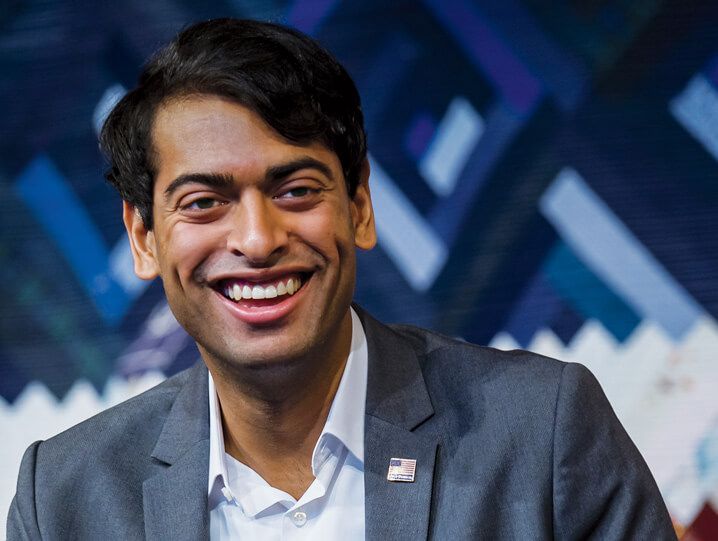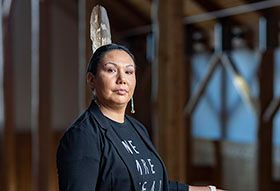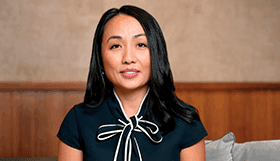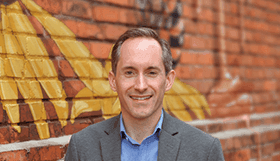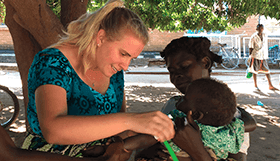UW Majors: Political Science and Environmental Studies with Certificate in Global Health
Age: 26 | Washington, DC
Founder And President, Millennial Action Project
If abandoning old partisan fault lines is the code to cracking America’s government gridlock, Steven Olikara says millennials have the key.
Olikara is a founder and chief executive of the Millennial Action Project, which organizes bipartisan caucuses of elected officials under the age of 40. Founded in 2013, the nonprofit is fostering cooperation among representatives of city councils, legislatures in 15 states, and the U.S. Congress.
“The university helped me discover my own life calling in public service and sharpened my skills to be a successful political entrepreneur.”
Today he’s based in Washington, DC, but Olikara says he got his real political education at the UW. He was senior class president in 2011–12, an election year marked by a divisive recall campaign aimed at Governor Scott Walker. It was also a time when his fellow millennials — born from the early 1980s to about 2000 — showed that, while less likely to identify with political parties, they were highly engaged in public service.
“I remember opening for the president of the United States [Barack Obama] on Library Mall in front of 26,500 people. From then on, I knew I could trust my voice, no matter the size of the audience,” Olikara says.
Now his voice is often sought by media and think tanks seeking insights about issues important to millennials, including education, employment, health care, immigration, technology, and volunteerism. He also takes his expertise outside the political sphere; he’s advised the private foundations of music artists Usher and Akon.
Olikara’s brand of social entrepreneurship is reflected in several projects at UW–Madison. The former Truman and Udall scholar helped start the Office of Sustainability, launch service learning for the Department of International Studies, and create the Wisconsin Idea Scholarship, the UW’s first student-endowed fund honoring public service.
He also joined his fellow senior class officers to place a plaque honoring the Wisconsin Idea atop Bascom Hill, and he currently serves on the external advisory board for the university’s International Division.
“My path into public service was unconventional, and the UW left a permanent mark,” Olikara says. “The university helped me discover my own life calling in public service and sharpened my skills to be a successful political entrepreneur.”
What’s the best piece of advice you’ve ever received?
If you think someone ought to do something, that person is probably you.
What are you reading now?
Bearing the Cross: Martin Luther King, Jr., and the Southern Christian Leadership Conference, by David Garrow.
What is the one thing every UW student must do?
Pitchers on the terrace is a must (even better if it’s pitchers while sailing on Lake Mendota).
What advice would you offer to graduating seniors?
Read The Alchemist by Paulo Coelho. The book explains that when we walk in our purpose, the universe conspires for our success. But pursuing one’s purpose inherently requires risk, hardship, creativity, and self-initiative.
What occupies your free time?
For the little free time that exists, I’m normally playing guitar, songwriting, going for a run, relaxing with friends, or working on one of many side projects.
What was your first job?
Pool boy
If you could trade places with any person for a week, living or dead, real or fictional, who would it be?
Bobby Kennedy
What is your favorite quote?
“The ultimate measure of a man is not where he stands in moments of comfort and convenience, but where he stands at times of challenge and controversy.” — Martin Luther King Jr.
Who is your hero? (or who or what inspires you?)
Other than my parents…Elon Musk, the founder of SpaceX and Tesla.
What lasting memories do you have of UW-Madison?
Of course, there are too many to mention here. One that stands out was hosting and introducing Neil deGrasse Tyson on the Union Terrace for our Senior Day (the precursor to commencement in Camp Randall). Dr. Tyson aptly described a “Woodstock-like” atmosphere for one of the largest crowds ever at the Union. It was amazing to see such a diversity of people from all corners of campus, from engineering to humanities, and even from across the Midwest. I met a young girl interested in science who convinced her mom to drive her six hours to attend the event.
